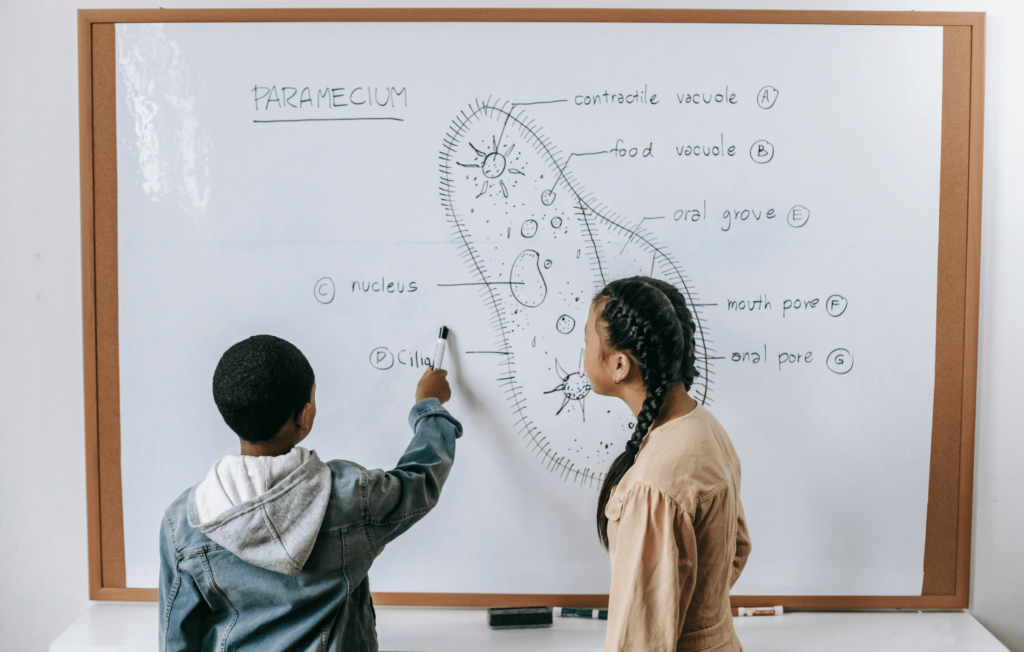What are learning pods?
Learning pods are small groups of 5-10 students who learn under the supervision of an adult guide at a designated location, like a home or community center. Learning pods have gained increasing popularity since the beginning of the pandemic because they offer a safe alternative to traditional schools and stay-at-home models. They provide a flexible learning structure in a collaborative environment.
Who supervises learning pods?
Certified teachers, adult guides, parents, or caregivers may facilitate a learning pod. Their role is to provide support to each student.
The Community Learning Collaborative, for instance, focused on hiring qualified candidates from diverse backgrounds. The CLC comprises four community-based organizations from Boston that organized 12 pods to serve students struggling with the adjustment to remote learning during the 2020-21 school year. The pods were staffed by a total of 25 to 30 educators. The organizations specifically hired teachers who shared the same racial and cultural identity as the students who attended them. Each organization that led a pod hired staff from their internal networks who were counselors and already had the credentials to work with children. Over 50 percent of the staff had a BA or MA degree, and the majority of staff were Spanish-speaking, the first language of many pod students. Hiring a qualified and diverse staff positively influenced the students in the pod.
Location
The environment in which a learning pod can take place varies. Some families have reported taking their pods birding in the park or hiking. Some families rent out spaces, like restaurants, to do experiments in the restaurant’s kitchen. Others find outdoor spaces so that the kids can move around outside. These are just a few examples of how parents are structuring their pods around their children’s needs and interests.
Examples: NH School District Partnerships
Learning pods may be available to you through your district tuition-free, depending on where you live.
The New Hampshire Department of Education has partnered with Prenda Schools to allow students to join learning pods at no cost through the Recovering Bright Futures Program.
Prenda guides provide support to students throughout the day, communicate with parents consistently, and attend IEP and 504 meetings when applicable. The guide leads the group of students in a traditional school building or, if unavailable, at another location such as a nonprofit or local library. They follow the district school calendar and hour requirements of the partner school, typically meeting five days a week. The program is aligned with New Hampshire Academic Standards, and students in a district pod have access to several student services, including meals and special education.
Kaipod Learning is another learning pod center that is offered to New Hampshire residents free of charge through the Recovering Bright Futures Program. Kaipod Learning has centers in Dover, Manchester, and Nashua, New Hampshire.
Examples: Non-profits
Neighborhood North is a play-oriented museum in Pennsylvania. Many students in the area were struggling when schools closed because they did not have computers or internet access to learn remotely. Several also lacked proper supervision because they had essential-working parents.
To help these students in need, Neighborhood North rounded up its board and funders so that they could create learning pods. They worked with the local school district and faith-based organizations to develop two learning pods for students in grades K-5. A diverse range of Neighborhood North and faith-based staff supervised the children in the pods, focusing on nurturing their social and emotional development, helping them complete work assigned by their teachers, and orchestrating additional activities like art, gardening, and creative play.
On an average day, the pod consisted of 12 to 15 students and four to five staff members, which allowed staff to provide one-on-one support as well as smaller groups of learning in specific areas.
Parents of the learning pod said that the pod had a positive impact on their children’s well-being while providing a sense of normalcy during a difficult time. It also provided a place for childcare so that they could work.
The impact on students
The Center for Reinventing Public Education conducted a case study analyzing the effects of learning pods established at the Cleveland Metropolitan School District during the 2020-2021 school year. In collaboration with the Cleveland Foundation and MyCom, CMSD developed learning pods with the help of funding from United Way, CMSD, CARES ACT funding, individual donors, and others.
The pods followed COVID-19 safety protocols, kept the learning pods within a nine-to-one ratio, and met eight hours a day at least four times a week. They hosted the learning pods at coordinated locations and hired the district’s existing staff members and other qualified candidates to supervise the pods and provide remote learning support in addition to the district’s teachers who implement remote instruction.
They found that establishing full-day learning pods for their most vulnerable students, primarily in grades K-8, resulted in higher attendance rates and grades than students who did not participate in learning pods. Furthermore, the report cites parent satisfaction, specifically amongst those whose children needed extra support stating learning pods eased their fears of their children falling behind.
Things to consider
As with most new developments, some people have identified concerns with learning pods.
Some learning pods are temporarily funded by state agencies or nonprofit organizations, while others charge tuition or will require families to pay out of pocket in the future. Learning pods run on a tuition fee basis vary in cost, but many range from thirty to one-hundred dollars an hour, similarly priced to private school education.
Learning pods do not operate as a school district, and when joining one, access to district support and services may be unavailable or limited. Additionally, some parents have reported concerns over the lack of administrative-level support to parents with issues and concerns related to their pod. Without a formal administration or regulatory oversight established, disciplinary measures may not be enforced as they would in a traditional school setting.




